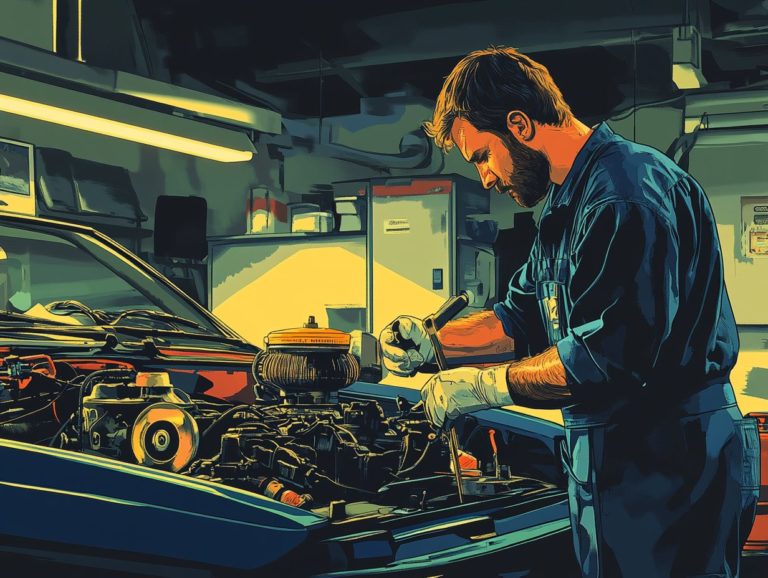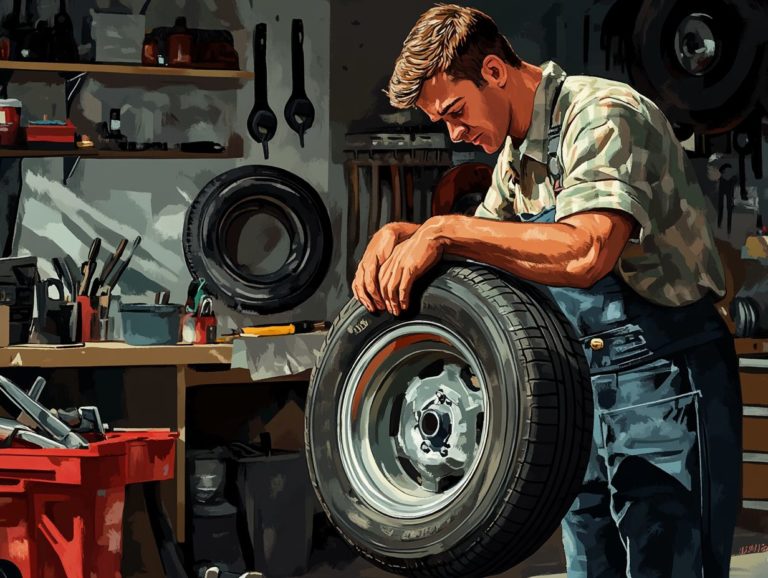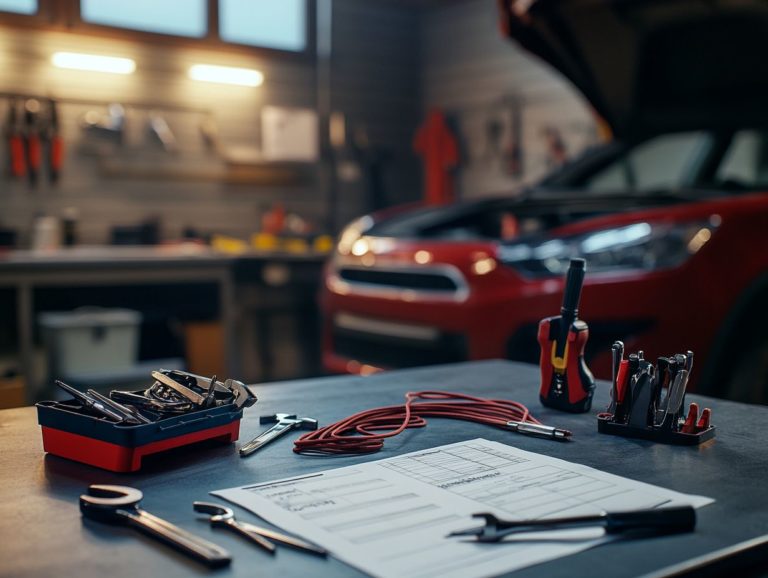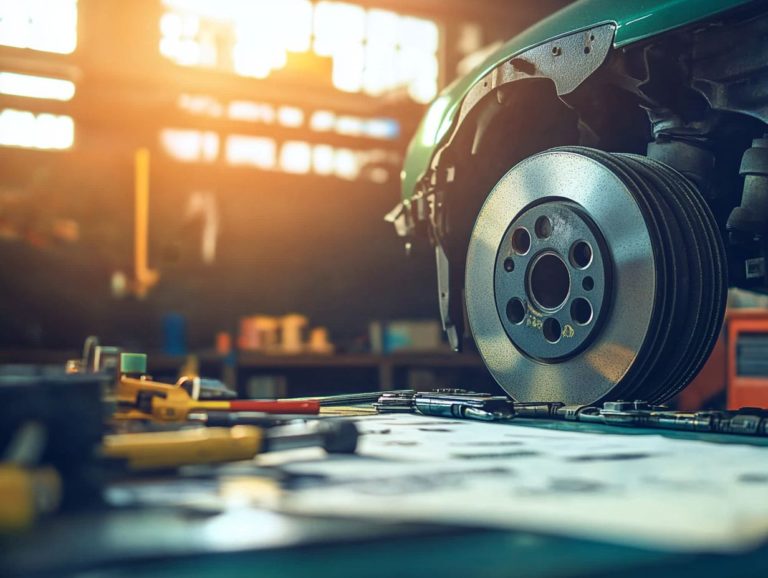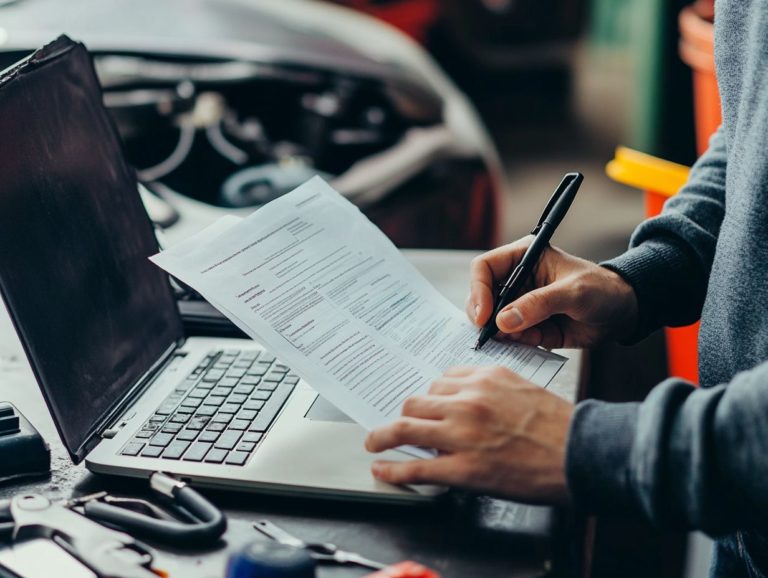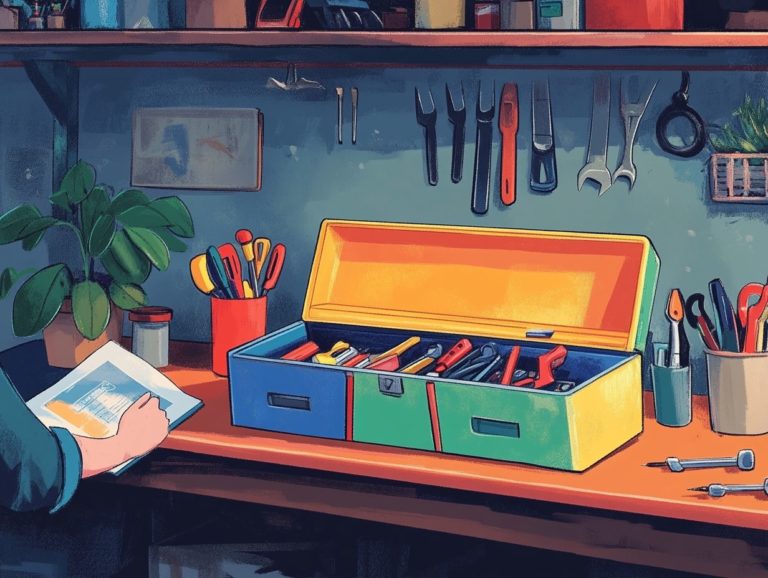5 Common Repairs for Family Vehicles
Maintaining a family vehicle is crucial for ensuring safety, reliability, and longevity. Understanding when and how to address repairs can save you time and money while keeping your loved ones safe on the road.
Here are five key repairs every vehicle owner should be familiar with, the benefits they offer, and the signs indicating they re overdue. We ll discuss whether these repairs are best tackled at home or if it s wiser to consult a professional, along with insights into the associated costs.
Ready to keep your family vehicle in peak condition? Let s jump right in and get your vehicle in top shape!
Contents
- Key Takeaways:
- 1. Replacing Brake Pads
- 2. Changing Oil and Oil Filter
- 3. Replacing Spark Plugs
- 4. Replacing Air Filters
- 5. Replacing Tires
- What Are the Benefits of Regular Maintenance for Family Vehicles?
- Frequently Asked Questions
- What are the 5 most common repairs for family vehicles?
- How often should I change my family vehicle’s oil?
- What are signs that my family vehicle’s brakes need to be replaced?
- Why is it important to regularly check and replace my family vehicle’s air filter?
- How often should I replace my family vehicle’s tires?
- Can I replace my family vehicle’s battery myself?
Key Takeaways:
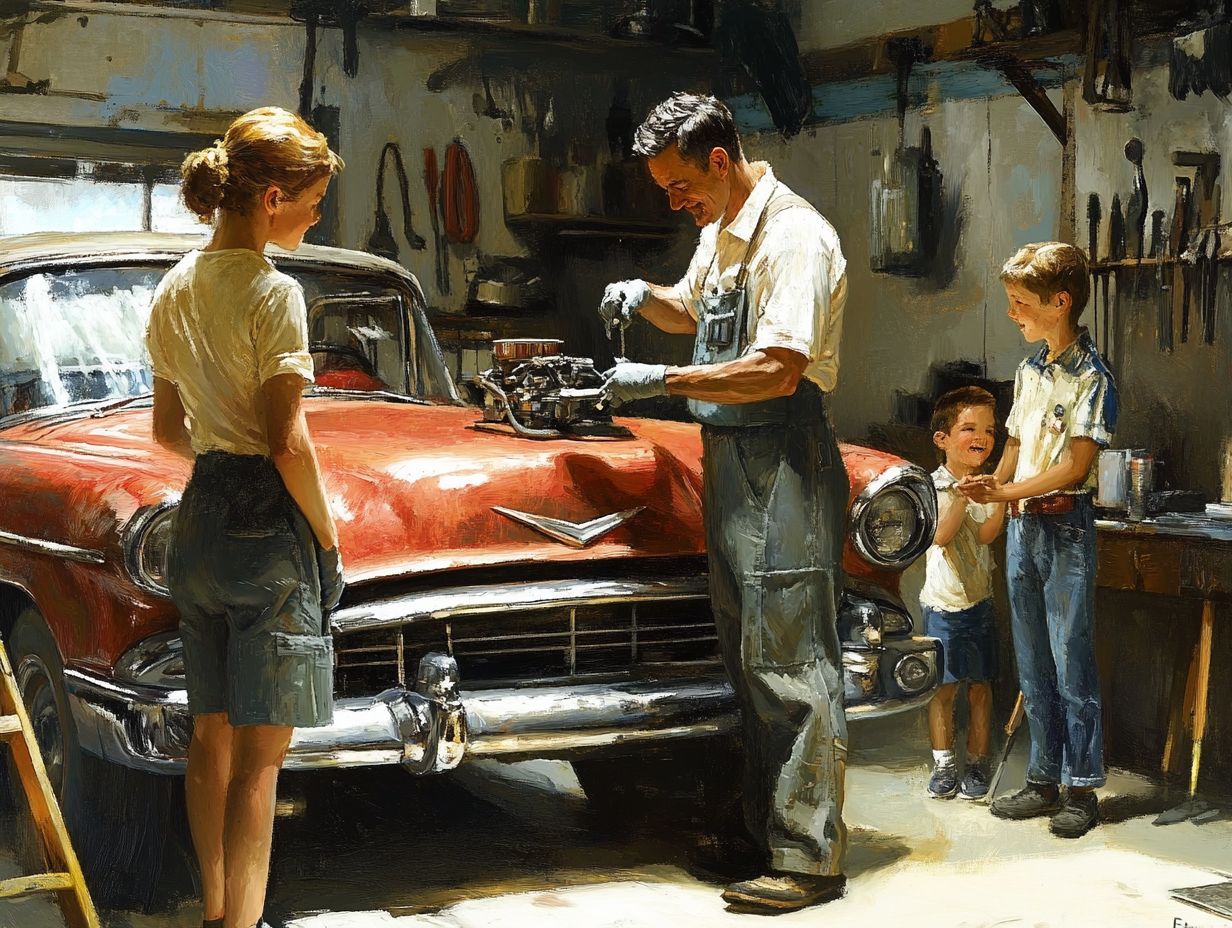
- Regular maintenance for family vehicles is crucial for safety and longevity.
- Signs of needed repairs include worn brake pads, dirty oil and filters, and worn tires.
- These repairs should be done regularly with recommended timeframes.
1. Replacing Brake Pads
Replacing brake pads is essential for your vehicle’s safety and longevity. Worn-out brake pads can compromise braking efficiency and potentially damage other vital parts, like the components that help the car stop and fluid systems.
It’s vital to recognize the signs of wear. For instance, if you hear squeaking or grinding noises, it’s a clear indication that the pads are nearing the end of their lifespan. A softer feel when pressing the brake pedal signals reduced effectiveness.
The replacement process typically involves lifting your vehicle, removing the wheel, and carefully swapping out the worn pads for new ones. This is also a great opportunity to inspect related components. By prioritizing timely maintenance, you enhance brake performance and protect critical elements, saving you from costly repairs down the line and ensuring a safe and smooth driving experience.
2. Changing Oil and Oil Filter
Changing the oil and oil filter is crucial for maintaining optimal engine performance. Clean oil lubricates your engine components, preventing issues that could disrupt your vehicle’s smooth operation.
You have several choices for oil conventional, synthetic, and high-mileage options each designed for specific needs, allowing you to select the best fit for your vehicle. Regular oil changes are generally recommended every 3,000 to 7,500 miles, depending on the type of oil and how you use your vehicle.
Don t overlook the importance of the oil filter. It keeps the oil clean by trapping dirt and debris, ensuring that contaminants don t circulate in your engine. Ignoring this essential maintenance can lead to increased friction, overheating, and severe engine damage. This highlights how vital consistent oil changes are for protecting your vehicle.
3. Replacing Spark Plugs
Replacing spark plugs is a crucial element of vehicle maintenance that keeps your engine running smoothly. Worn or faulty spark plugs can lead to misfires and reduced fuel efficiency, affecting your car’s overall performance.
It’s important to recognize the signs that indicate it s time for a change. Common symptoms include difficulty starting, rough idling, or reduced acceleration. Once you notice these issues, you can take proactive steps to protect your vehicle.
Changing spark plugs is easy. Just remove the old ones, check the ignition system, and put in the new ones to enhance electrical performance. By prioritizing this task, you play a vital role in safeguarding your engine, ensuring smoother operation, and extending the overall lifespan of your car while maintaining optimal fuel efficiency.
4. Replacing Air Filters

Replacing air filters is essential for maintaining your vehicle s engine health. A clean air filter optimizes air intake, boosting fuel efficiency and minimizing the risk of engine issues caused by dirt and debris.
You ll encounter several types of air filters, such as paper, foam, and cotton. Each is designed for specific roles within the fuel system. Regular maintenance of these filters not only enhances combustion the process of burning fuel in the engine for power but also helps prevent potential problems like reduced engine performance and heightened emissions.
Neglecting air filter maintenance leads to clogs that starve your engine of crucial air, resulting in costly repairs and annoying warning lights on your dashboard. This oversight puts your car s efficiency at risk and shortens its lifespan. It s a reminder of the importance of diligent vehicle care and timely repairs to ensure a smooth ride on the road.
5. Replacing Tires
Replacing tires is a vital aspect of vehicle maintenance that boosts your safety and enhances handling and fuel efficiency. Worn or improperly inflated tires can compromise traction and accelerate wear on other components of your vehicle.
Stay alert for signs that your tires need replacing, such as uneven tread wear, visible cracks, or insufficient tread depth.
Regularly rotating your tires is key to ensuring even wear and extending their lifespan. Additionally, maintaining the proper tire pressure improves performance and maximizes fuel consumption.
Well-maintained tires are crucial for your vehicle’s overall integrity, providing stability and preventing excessive strain on the suspension and braking systems. Neglecting tire maintenance can lead to costly repairs later, highlighting the importance of proactive care for your vehicle.
What Are the Benefits of Regular Maintenance for Family Vehicles?
Keeping your family vehicles in check unlocks a treasure trove of benefits, including enhanced safety, improved fuel efficiency, and protection against costly engine and electrical issues. Additionally, knowing 5 tips for quick common car repairs can help keep your car reliable for all your family adventures.
By routinely checking and servicing key components, you can significantly extend the longevity of your vehicles. This ultimately boosts their resale value when it s time for an upgrade. For instance, getting an oil change every few thousand miles keeps your engine running smoothly and helps prevent severe damage from neglected maintenance.
Tackling minor electrical issues during regular check-ups can save you from unexpected breakdowns. For a deeper insight, consider understanding the most common vehicle repairs. This allows you to travel with peace of mind, knowing your vehicle is in peak condition and ready to handle the demands of daily life and spontaneous road trips.
What Are the Signs That Indicate These Repairs Are Needed?
Identifying the signs that indicate necessary repairs is essential for maintaining your vehicle’s safety and performance. Symptoms such as unusual noises, warning lights, or changes in handling can be telltale signs of potential engine problems or electrical issues.
Staying vigilant for these indicators is crucial, as recognizing them in a timely manner can save you from costly repairs later on. For example, a persistent rattling sound might point to loose exhaust components, while dashboard warnings may suggest low oil pressure or a malfunctioning brake system. If you experience vibrations during acceleration, it could hint at tire imbalances or alignment issues.
By addressing these red flags early, you not only protect your investment but also enhance the longevity of your vehicle. This ensures it operates s smoothly and efficiently on the road. Stay proactive and keep your vehicle in top shape for every journey!
How Often Should Repairs Be Done?
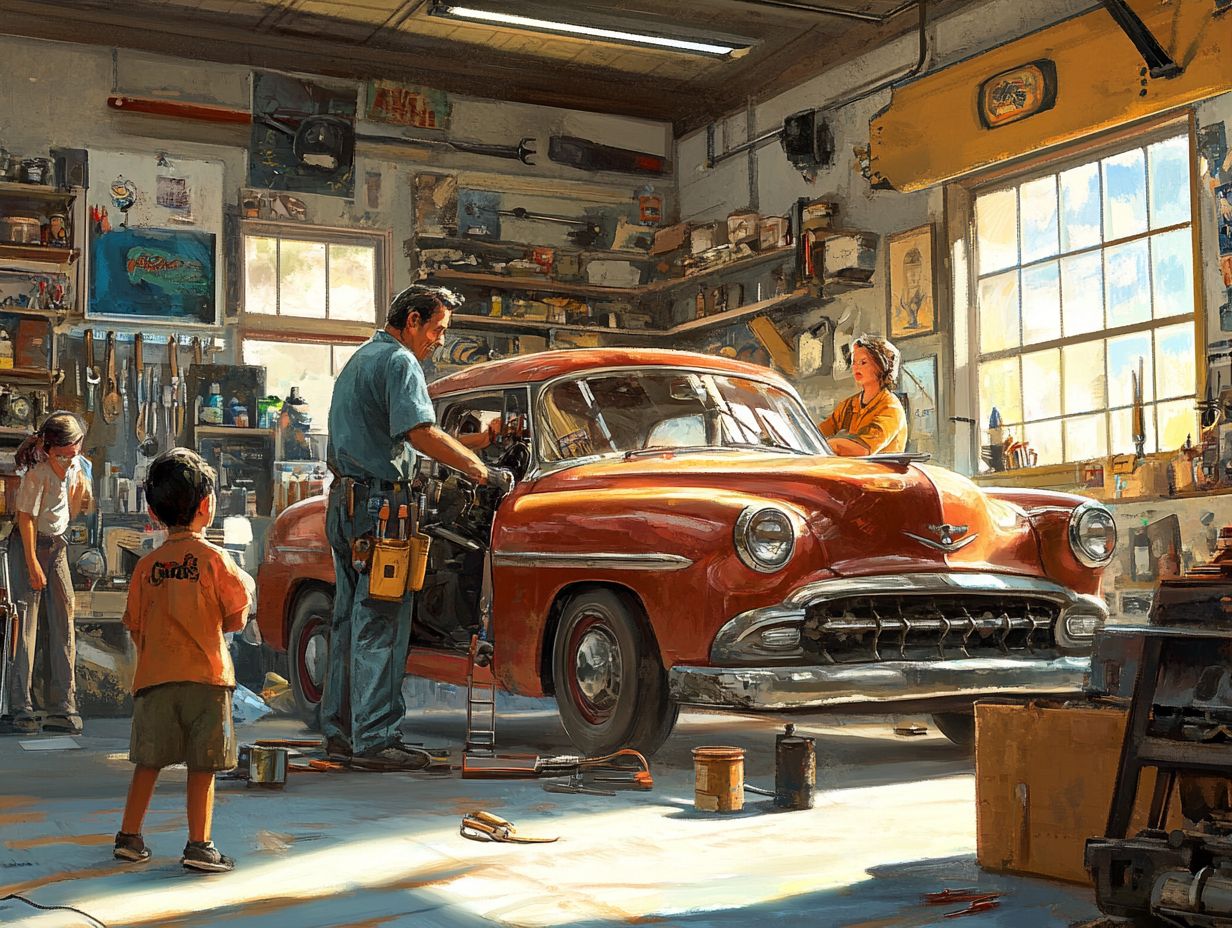
Knowing when to perform repairs is crucial for your vehicle’s health. To ensure your car remains safe and efficient, consider these tips for maintaining a family vehicle and follow mileage markers along with the manufacturer’s recommendations.
Regular maintenance helps catch small problems before they become big, costly repairs. To stay proactive, follow 5 essential checks to avoid common repairs such as changing your engine oil every 3,000 to 5,000 miles, rotating your tires every 6,000 to 8,000 miles, and checking your brakes and fluids every 20,000 to 50,000 miles.
Set a schedule for maintenance tasks to enjoy a smoother ride. This also reduces the risk of unexpected breakdowns that can disrupt your daily life.
What Are the Potential Risks of Not Doing These Repairs?
Neglecting necessary repairs can expose you to serious risks, such as significant engine problems, unsafe car conditions, and costly electrical issues. This can undermine the reliability of your vehicle.
For instance, ignoring warning lights on your dashboard can turn a simple sensor issue into catastrophic engine failure. This leaves you with repair bills that may make your wallet weep. Skipping regular brake inspections increases the risk of brake failure, creating dangerous driving conditions.
Regular maintenance is your best ally. It helps catch issues early and ensures your vehicle runs efficiently. This also extends its lifespan while safeguarding you against unexpected breakdowns.
Can These Repairs Be Done at Home or Should a Professional Be Consulted?
Determining whether you can tackle repairs at home or if you need a professional is essential for keeping your vehicle in good shape. Some tasks, like changing the oil and rotating tires, are often within the reach of enthusiastic DIYers, especially with 5 tips for DIY common car repairs.
Other tasks, like electrical repairs, require expertise that’s best left to professionals. Assess your skill level and the complexity of the repair before diving into a DIY project.
Minor repairs, such as replacing air filters or brake pads, can offer a great sense of accomplishment. They also deepen your understanding of automotive mechanics.
However, tackling complex issues without adequate knowledge can lead to headaches down the line. Knowing when to seek professional assistance is vital for your car’s longevity and safety.
What Are the Average Costs for These Repairs?
Understanding the average costs for common repairs is essential for budgeting. Additionally, following these 5 tips for avoiding common car repairs can help ensure timely car maintenance, preventing costly engine problems or electrical issues that might arise later.
By grasping repair expenses, you can make informed decisions that align with your financial situation. For example, basic maintenance like oil changes usually costs between $30 and $100. Brake repairs can range from $150 to $500, depending on the components that need attention.
Several factors influence these prices, including specific parts needed, labor rates at various shops, and the urgency of the repair. When repairs are time-sensitive, premium charges may apply.
Investing in regular maintenance not only extends your vehicle’s lifespan but also decreases the chances of incurring hefty costs from overlooked repairs.
Frequently Asked Questions
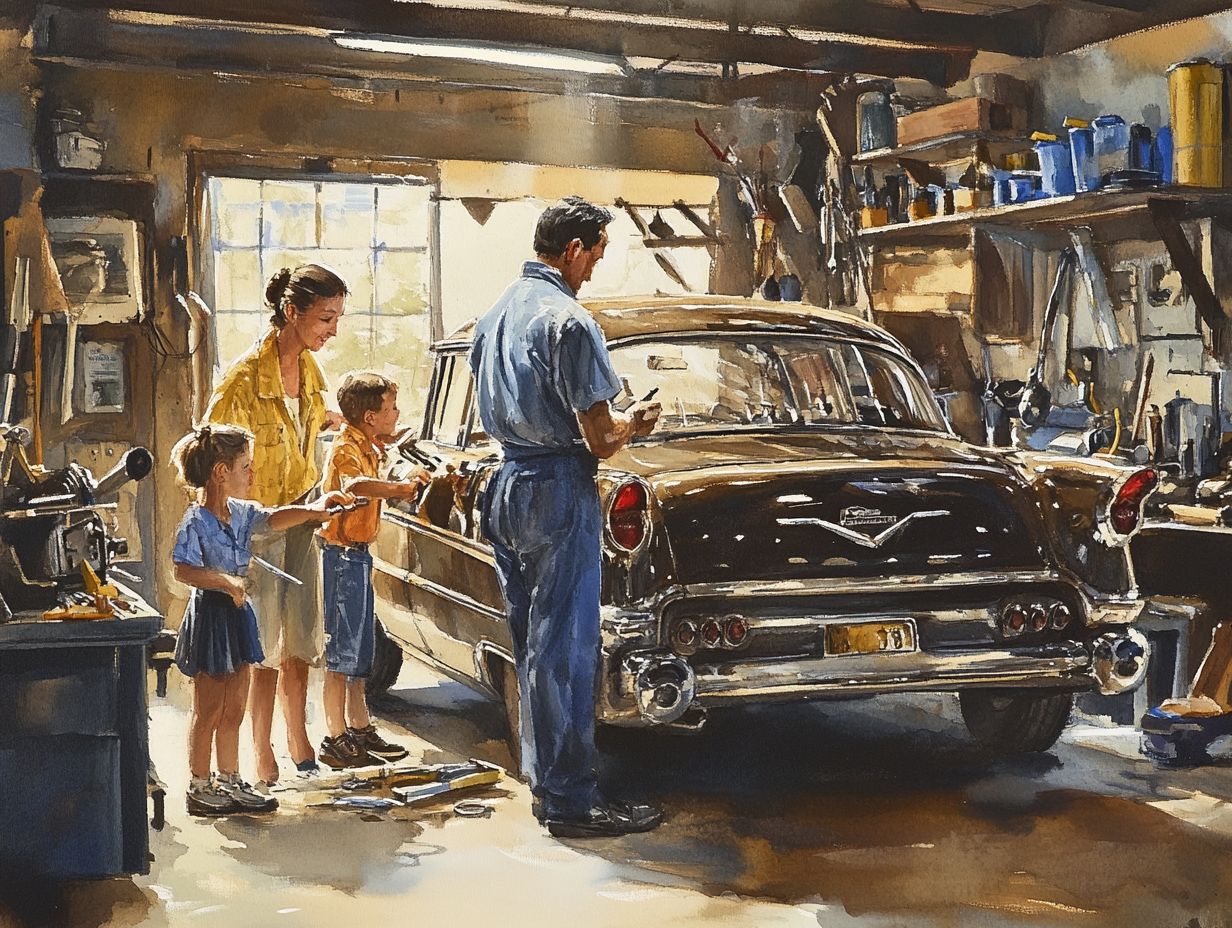
What are the 5 most common repairs for family vehicles?
The five most common repairs for family vehicles include tire changes, oil changes, brake pad replacements, battery replacements, and repairs in older cars.
How often should I change my family vehicle’s oil?
Wondering when to change your vehicle’s oil? Aim for every 3,000 to 5,000 miles or every 3 to 6 months!
What are signs that my family vehicle’s brakes need to be replaced?
Is your car making strange noises? Squealing or grinding sounds, shaky steering when braking, and longer stopping distances may mean your brakes need replacing.
Why is it important to regularly check and replace my family vehicle’s air filter?
Checking and replacing your air filter helps your car use less gas, keeps your engine running longer, and boosts overall performance.
How often should I replace my family vehicle’s tires?
Replace tires every 6 years or 50,000 miles whichever comes first. Regular inspections and rotations help your tires last longer!
Can I replace my family vehicle’s battery myself?
You can replace your vehicle’s battery yourself, but it s best to let a professional handle it for safety and correctness.

